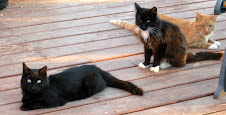Continuing my inquiry about prairie dogs from last week, I typed the term into the search box of SIRS Discoverer. My results came up with 175 items - newspapers, magazines, reference, and pictures, but no websites. In browsing the first 25 items, I noted various Lexiles levels, several activities, many photos and that a few items were fiction. The article "Dog Eat Dog" from Current Science caught my eye. It has a 1070 Lexile level and was marked as challenging, so I knew it was most likely for older students. I found three photos of prairie dogs, Internet links, a Critical Thinking activity, and a Multiple Choice quiz on the content. Priaire dogs are cannibals! Moms eat other mom's babies to give them protein to nurse their own babies - oh my. Speaking of baby prairie dogs, "Roadrunner Rescue" from Highlights for Children was one of the fiction items listed. It has a much lower Lexile at 560 and turned out to be a short story with illustrations about a roadrunner who saves a baby prairie dog from being eaten by a rattlesnake.
On to Database Features: Country Facts... no England, no Great Britain.. it's under United Kingdom! In addition to a map, there are three levels of graphic organizers for notetaking, major facts listed by categories, a timeline of events, contact info, a list of sources and links to related articles. When clicking on the map there is also a link to "show all articles related to this picture" which took me to an 2001 article about a new species of T-Rex.
Maps of the World allows searching by clicking on a category, typing in a search term or browsing by letter. Using the search term "United Kingdom" I found six different maps. The first was an outline map of the country and the surrounding area which could be printed for students to label or projected for a class activity. The second map listed was the answer key. Other maps are full color and all are printable in PDF.
Pathfinders contains four major sections: Born This Month, Holidays & Celebrations, Suggested Research Topics, and Challenge Quest. Born this Month lists famous people with links to a list of items about them. For example, selecting Beatrix Potter I discovered 15 websites which led me to an electronic copy of The Tale of the Flopsy Bunnies with text and illustrations. Holidays & Celebrations lists links (Canada Day, Independence Day, and Bastille Day for July) under Subject Headings, Subject Tree Paths and Keywords. Suggested Research Topics is arranged in the same manner for major subjects of interest to kids and schools - Explorers, Dinosaurs, Global Warming, etc. Challenge Quest has a question of the month with the question, the answer and a pathfinder from the previous month.
Overall, I think SIRS Discoverer is an excellent resource for both students and teachers. It contains a wealth of sources and would be a valuable tool to use to teach beginning and intermediate research skills, to find articles on the same topic at different reading levels, to locate age appropriate websites, etc.
On to SIRS Issues Researcher tomorrow....
Web 2.0
...on the trail of e-Resources
Tuesday, July 6, 2010
Subscribe to:
Post Comments (Atom)







1 comment:
Thanks for your comments, Joan--and for pointing out that England is listed under "United Kingdom"! You also taught me some things I did NOT want to know about prairie dogs! You mentioned that Discoverer would be a good teaching tool for research. I will mention the link for Educator's Resources (in tiny print at the bottom of the home page) as having pdf workbook pages to assist in teaching the research process.
Post a Comment